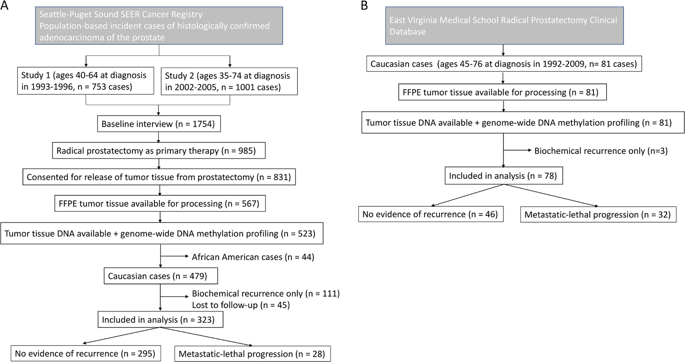当前位置:
X-MOL 学术
›
Prostate Cancer Prostatic. Dis.
›
论文详情
Our official English website, www.x-mol.net, welcomes your feedback! (Note: you will need to create a separate account there.)
Copy number alterations are associated with metastatic-lethal progression in prostate cancer.
Prostate Cancer and Prostatic Diseases ( IF 4.8 ) Pub Date : 2020-02-18 , DOI: 10.1038/s41391-020-0212-8 Xiaoyu Wang 1 , Catherine S Grasso 2 , Kristina M Jordahl 1 , Suzanne Kolb 1 , Yaw A Nyame 1, 3 , Jonathan L Wright 1, 3 , Elaine A Ostrander 4 , Dean A Troyer 5 , Raymond Lance 6 , Ziding Feng 1, 7 , James Y Dai 1, 7 , Janet L Stanford 1, 8
Prostate Cancer and Prostatic Diseases ( IF 4.8 ) Pub Date : 2020-02-18 , DOI: 10.1038/s41391-020-0212-8 Xiaoyu Wang 1 , Catherine S Grasso 2 , Kristina M Jordahl 1 , Suzanne Kolb 1 , Yaw A Nyame 1, 3 , Jonathan L Wright 1, 3 , Elaine A Ostrander 4 , Dean A Troyer 5 , Raymond Lance 6 , Ziding Feng 1, 7 , James Y Dai 1, 7 , Janet L Stanford 1, 8
Affiliation

|
BACKGROUNDS
Aside from Gleason score few factors accurately identify the subset of prostate cancer (PCa) patients at high risk for metastatic progression. We hypothesized that copy number alterations (CNAs), assessed using CpG methylation probes on Illumina Infinium® Human Methylation450 (HM450K) BeadChip arrays, could identify primary prostate tumors with potential to develop metastatic progression.
METHODS
Epigenome-wide DNA methylation profiling was performed in surgically resected primary tumor tissues from two cohorts of PCa patients with clinically localized disease who underwent radical prostatectomy (RP) as primary therapy and were followed prospectively for at least 5 years: (1) a Fred Hutchinson (FH) Cancer Research Center-based cohort (n = 323 patients); and (2) an Eastern Virginia (EV) Medical School-based cohort (n = 78 patients). CNAs were identified using the R package ChAMP. Metastasis was confirmed by positive bone scan, MRI, CT or biopsy, and death certificates confirmed cause of death.
RESULTS
We detected 15 recurrent CNAs were associated with metastasis in the FH cohort and replicated in the EV cohort (p < 0.05) without adjusting for Gleason score in the model. Eleven of the recurrent CNAs were associated with metastatic progression in the FH cohort and validated in the EV cohort (p < 0.05) when adjusting for Gleason score.
CONCLUSIONS
This study shows that CNAs can be reliably detected from HM450K-based DNA methylation data. There are 11 recurrent CNAs showing association with metastatic-lethal events following RP and improving prediction over Gleason score. Genes affected by these CNAs may functionally relate to tumor aggressiveness and metastatic progression.
中文翻译:

拷贝数改变与前列腺癌的转移致死进展有关。
背景除了 Gleason 评分之外,很少有因素能准确识别出转移进展高风险的前列腺癌 (PCa) 患者亚群。我们假设在 Illumina Infinium® Human Methylation450 (HM450K) BeadChip 阵列上使用 CpG 甲基化探针评估的拷贝数改变 (CNA) 可以识别出可能发展为转移性进展的原发性前列腺肿瘤。方法 在手术切除的原发性肿瘤组织中进行表观基因组范围的 DNA 甲基化分析,这些组织来自两组患有临床局限性疾病的 PCa 患者,这些患者接受了根治性前列腺切除术 (RP) 作为主要治疗,并进行了至少 5 年的前瞻性随访:(1) Fred基于哈钦森 (FH) 癌症研究中心的队列(n = 323 名患者);(2) 基于东弗吉尼亚 (EV) 医学院的队列(n = 78 名患者)。使用 R 包 ChAMP 识别 CNA。骨扫描、MRI、CT或活检阳性证实转移,死亡证明证实死因。结果 我们在 FH 队列中检测到 15 个复发性 CNA 与转移相关,并在 EV 队列中复制(p < 0.05),无需调整模型中的 Gleason 评分。在 FH 队列中,11 个复发性 CNA 与转移性进展相关,并在调整 Gleason 评分时在 EV 队列中得到验证(p < 0.05)。结论 本研究表明,可以从基于 HM450K 的 DNA 甲基化数据中可靠地检测到 CNA。有 11 个复发性 CNA 显示与 RP 后的转移致死事件相关,并改善了对 Gleason 评分的预测。
更新日期:2020-02-18
中文翻译:

拷贝数改变与前列腺癌的转移致死进展有关。
背景除了 Gleason 评分之外,很少有因素能准确识别出转移进展高风险的前列腺癌 (PCa) 患者亚群。我们假设在 Illumina Infinium® Human Methylation450 (HM450K) BeadChip 阵列上使用 CpG 甲基化探针评估的拷贝数改变 (CNA) 可以识别出可能发展为转移性进展的原发性前列腺肿瘤。方法 在手术切除的原发性肿瘤组织中进行表观基因组范围的 DNA 甲基化分析,这些组织来自两组患有临床局限性疾病的 PCa 患者,这些患者接受了根治性前列腺切除术 (RP) 作为主要治疗,并进行了至少 5 年的前瞻性随访:(1) Fred基于哈钦森 (FH) 癌症研究中心的队列(n = 323 名患者);(2) 基于东弗吉尼亚 (EV) 医学院的队列(n = 78 名患者)。使用 R 包 ChAMP 识别 CNA。骨扫描、MRI、CT或活检阳性证实转移,死亡证明证实死因。结果 我们在 FH 队列中检测到 15 个复发性 CNA 与转移相关,并在 EV 队列中复制(p < 0.05),无需调整模型中的 Gleason 评分。在 FH 队列中,11 个复发性 CNA 与转移性进展相关,并在调整 Gleason 评分时在 EV 队列中得到验证(p < 0.05)。结论 本研究表明,可以从基于 HM450K 的 DNA 甲基化数据中可靠地检测到 CNA。有 11 个复发性 CNA 显示与 RP 后的转移致死事件相关,并改善了对 Gleason 评分的预测。


























 京公网安备 11010802027423号
京公网安备 11010802027423号